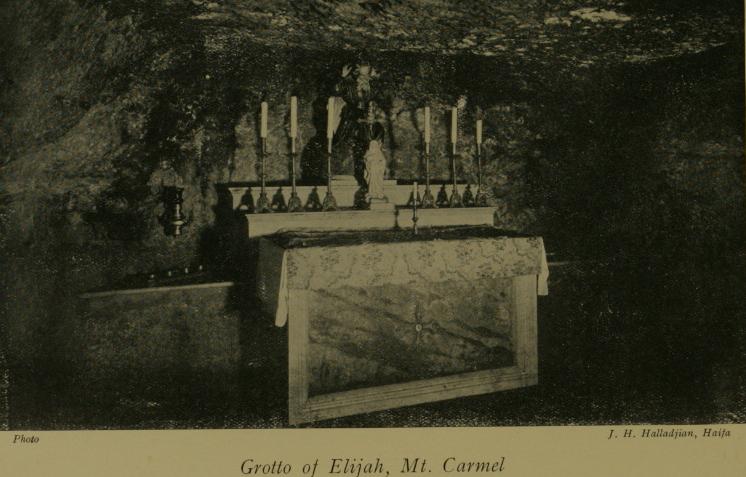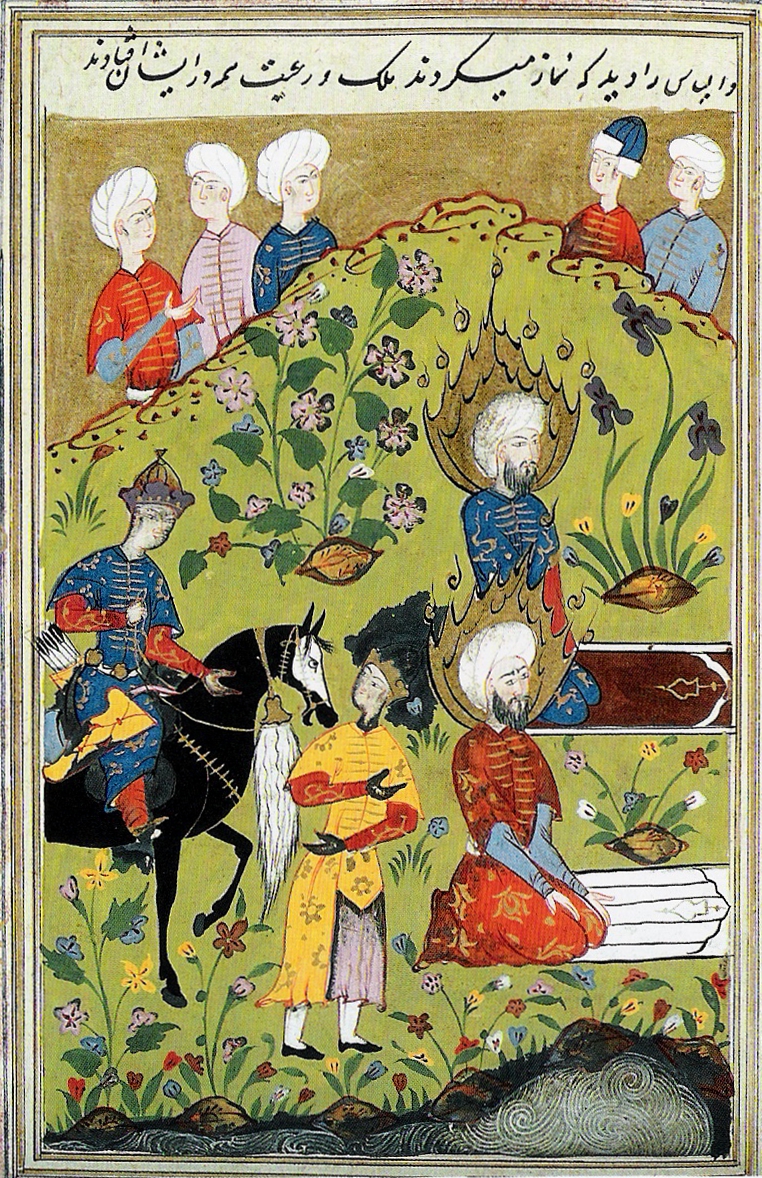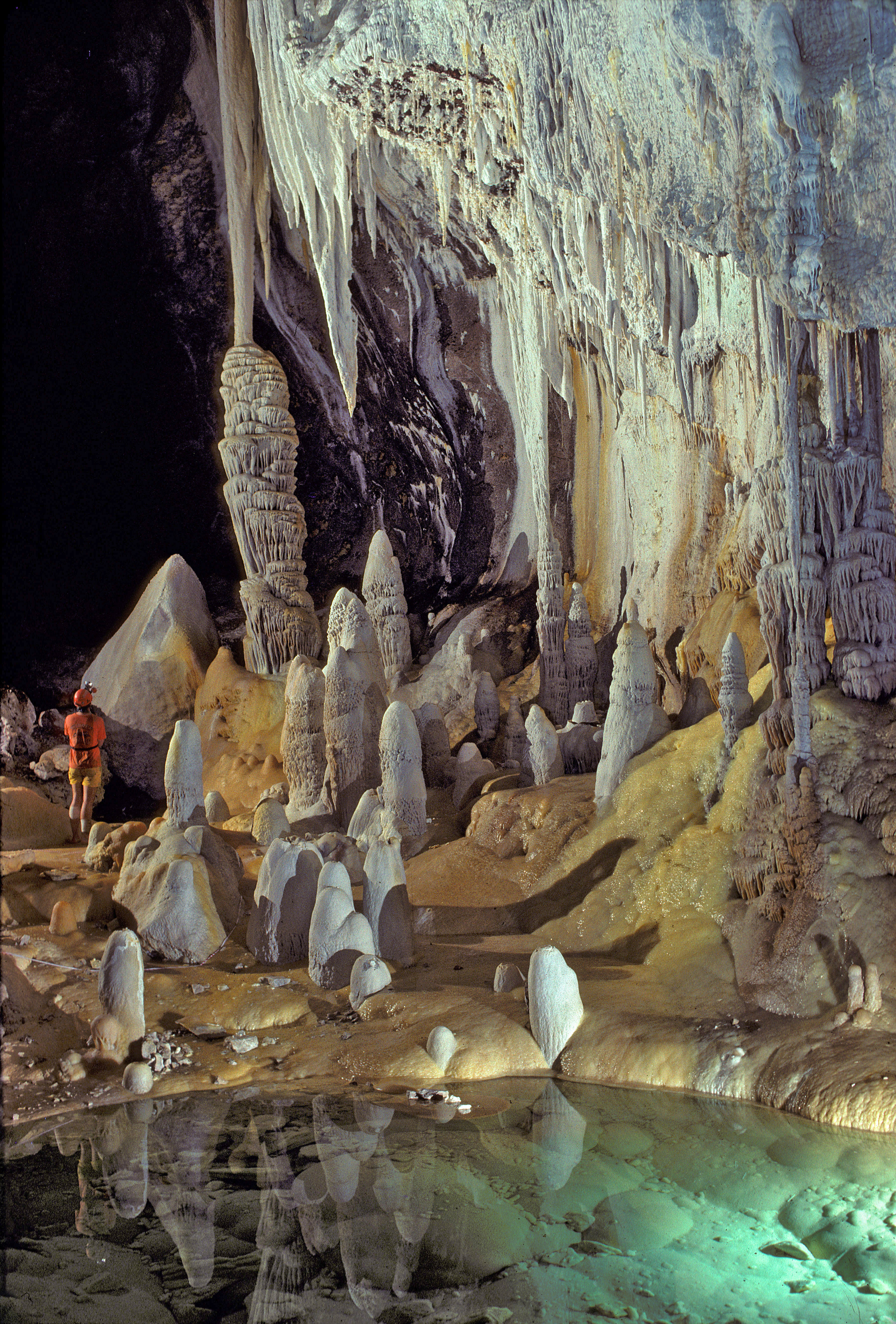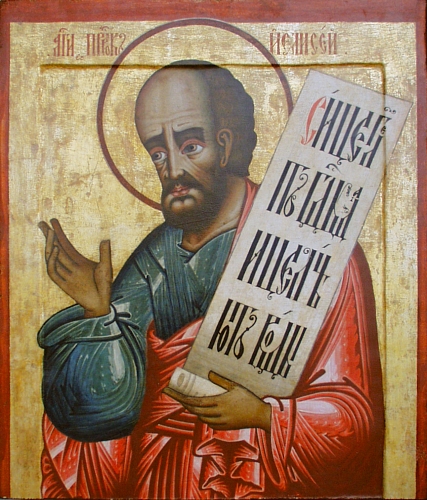|
Cave Of Elijah
Cave of Elijah is the name used for two grottoes on Mount Carmel, in Haifa, Israel, associated with Biblical prophet Elijah. According to tradition, Elijah is believed to have prayed at a grotto before challenging the priests of Baal on Mount Carmel (), and to have hidden in either the same or in another nearby grotto from the wrath of Jezebel (). Two grottoes on Mount Carmel, in Haifa, have been historically referred to as "the Cave of Elijah". The main shrine known as the "Cave of Elijah" is located on Haifa's Allenby Road, on Mount Carmel, approximately 40 m above sea level. For centuries, it has been a destination for Jewish, Christian, Muslim and Druze pilgrims. The Cave of Elijah in Allenby Road is divided into twos sections for praying, one for men and one for women; the cave is behind a velvet curtain. The Cave is also known as el- Khader in Arabic. The Druze regard it as holy, and many among them identify Elijah as "el-Khidr", the green prophet who symbolizes wate ... [...More Info...] [...Related Items...] OR: [Wikipedia] [Google] [Baidu] |
Grotto Of Elijah, Mt Carmel
A grotto is a natural or artificial cave used by humans in both modern times and antiquity, and historically or prehistorically. Naturally occurring grottoes are often small caves near water that are usually flooded or often flooded at high tide. Sometimes, artificial grottoes are used as garden features. The ''Blue Grotto (Capri), Grotta Azzurra'' at Capri and the grotto at Tiberius' Villa Jovis in the Bay of Naples are examples of popular natural seashore grottoes. Whether in tidal water or high up in hills, grottoes are generally made up of limestone geology, where the acidity of standing water has Solvation, dissolved the carbonates in the rock matrix as it passes through what were originally small fissures. Etymology The word ''grotto'' comes from Italian language, Italian ''grotta'', Vulgar Latin ''grupta'', and Latin ''crypta'' ("a crypt"). It is also related by a historical accident to the word ''grotesque''. In the late 15th century, Romans accidentally unearthed Ne ... [...More Info...] [...Related Items...] OR: [Wikipedia] [Google] [Baidu] |
Khidr
Al-Khidr () ( ar, ٱلْخَضِر, al-Khaḍir), also transcribed as al-Khadir, Khader, Khidr, Khizr, Khazer, Khadr, Khedher, Khizir, Khizar, is a figure described but not mentioned by name in the Quran as a righteous servant of God possessing great wisdom or mystic knowledge. In various Islamic and non-Islamic traditions, Khidr is described as a messenger, prophet or wali, who guards the sea, teaches secret knowledge and aids those in distress. He prominently figures as patron of the Islamic saint ibn Arabi. The figure of al-Khidr has been syncretized over time with various other figures including Dūraoša and Sorūsh in Iran, Sargis the General and Saint George in Asia Minor and the Levant, Samael (the divine prosecutor) in Judaism, Elijah among the Druze, John the Baptist in Armenia, and Jhulelal in Sindh and Punjab in South Asia. Though not mentioned by name in the Quran, he is named by Islamic scholars as the figure described in as a servant of God who has been given ... [...More Info...] [...Related Items...] OR: [Wikipedia] [Google] [Baidu] |
Caves Of Israel
A cave or cavern is a natural void in the ground, specifically a space large enough for a human to enter. Caves often form by the weathering of rock and often extend deep underground. The word ''cave'' can refer to smaller openings such as sea caves, rock shelters, and grottos, that extend a relatively short distance into the rock and they are called ''exogene'' caves. Caves which extend further underground than the opening is wide are called ''endogene'' caves. Speleology is the science of exploration and study of all aspects of caves and the cave environment. Visiting or exploring caves for recreation may be called ''caving'', ''potholing'', or ''spelunking''. Formation types The formation and development of caves is known as ''speleogenesis''; it can occur over the course of millions of years. Caves can range widely in size, and are formed by various geological processes. These may involve a combination of chemical processes, erosion by water, tectonic forces, microorgani ... [...More Info...] [...Related Items...] OR: [Wikipedia] [Google] [Baidu] |
Sabbath Of Consolation
In Abrahamic religions, the Sabbath () or Shabbat (from Hebrew ) is a day set aside for rest and worship. According to the Book of Exodus, the Sabbath is a day of rest on the seventh day, commanded by God to be kept as a holy day of rest, as God rested from creation. The practice of observing the Sabbath (Shabbat) originates in the biblical commandment "Remember the sabbath day, to keep it holy". The Sabbath is observed in Judaism, Sabbatarian forms of Christianity (such as many Protestant and Eastern denominations), and Islam. Observances similar to, or descended from, the Sabbath also exist in other religions. The term may be generally used to describe similar weekly observances in other religions. Biblical Sabbath Sabbath (as the verb שָׁבַת֙ ''shabbat'') is first mentioned in the Genesis creation narrative, where the seventh day is set aside as a day of rest (in Hebrew, ''shabbat'') and made holy by God (). Observation and remembrance of Sabbath ( ''shabbat'') is ... [...More Info...] [...Related Items...] OR: [Wikipedia] [Google] [Baidu] |
Richard Pococke
Richard Pococke (19 November 1704 – 25 September 1765)''Notes and Queries'', p. 129. was an English-born churchman, inveterate traveller and travel writer. He was the Bishop of Ossory (1756–65) and Meath (1765), both dioceses of the Church of Ireland. However, he is best known for his travel writings and diaries. Biography Pococke was born in Southampton and educated at Corpus Christi College, Oxford, receiving a Bachelor of Law degree. His father was the Reverend Richard Pococke and his mother was Elizabeth Milles, the daughter of Rev. Isaac Milles ''the younger'', son of Rev. Isaac Milles (1638–1720). His parents were married on 26 April 1698. Pococke's uncle, Thomas Milles, was a professor of Greek. He was also distantly related to Edward Pococke, the English Orientalist and biblical scholar.''Nichols'', p. 157. Rev. Jeremiah II Milles (1714–1784) was a first cousin. His family connections meant he advanced rapidly in the church, becoming vicar-general of the Dioce ... [...More Info...] [...Related Items...] OR: [Wikipedia] [Google] [Baidu] |
Prelate
A prelate () is a high-ranking member of the Christian clergy who is an ordinary or who ranks in precedence with ordinaries. The word derives from the Latin , the past participle of , which means 'carry before', 'be set above or over' or 'prefer'; hence, a prelate is one set over others. The archetypal prelate is a bishop, whose prelature is his particular church. All other prelates, including the regular prelates such as abbots and major superiors, are based upon this original model of prelacy. Related terminology In a general sense, a "prelate" in the Roman Catholic Church and other Christian churches is a bishop or other ecclesiastical person who possesses ordinary authority of a jurisdiction, i.e., of a diocese or similar jurisdiction, e.g., ordinariates, apostolic vicariates/ exarchates, or territorial abbacies. It equally applies to cardinals, who enjoy a kind of "co-governance" of the church as the most senior ecclesiastical advisers and moral representatives of th ... [...More Info...] [...Related Items...] OR: [Wikipedia] [Google] [Baidu] |
Elisha
Elisha ( ; or "God is my salvation", Greek: , ''Elis îos'' or , ''Elisaié,'' Latin: ''Eliseus'') was, according to the Hebrew Bible, a prophet and a wonder-worker. His name is commonly transliterated into English as Elisha via Hebrew, Eliseus via Greek and Latin, or Alyasa via Arabic, and Elyasa or Elyesa via Turkish. Also mentioned in the New Testament and the Quran, Elisha is venerated as a prophet in Judaism, Christianity and Islam and writings of the Baháʼí Faith refer to him by name. Before he settled in Samaria, Elisha passed some time on Mount Carmel. He served from 892 until 832 BC as an advisor to the third through the eighth kings of Judah, holding the office of "prophet in Israel". He is called a patriot because of his help to soldiers and kings. In the biblical narrative, he is a disciple and protégé of Elijah, and after Elijah was taken up in a whirlwind, Elisha received a double portion of his power and he was accepted as the leader of the sons of th ... [...More Info...] [...Related Items...] OR: [Wikipedia] [Google] [Baidu] |
Synagogue
A synagogue, ', 'house of assembly', or ', "house of prayer"; Yiddish: ''shul'', Ladino: or ' (from synagogue); or ', "community". sometimes referred to as shul, and interchangeably used with the word temple, is a Jewish house of worship. Synagogues have a place for prayer (the main sanctuary and sometimes smaller chapels), where Jews attend religious Services or special ceremonies (including Weddings, Bar Mitzvahs or Bat Mitzvahs, Confirmations, choir performances, or even children's plays), have rooms for study, social hall(s), administrative and charitable offices, classrooms for religious school and Hebrew school, sometimes Jewish preschools, and often have many places to sit and congregate; display commemorative, historic, or modern artwork throughout; and sometimes have items of some Jewish historical significance or history about the Synagogue itself, on display. Synagogues are consecrated spaces used for the purpose of Jewish prayer, study, assembly, and r ... [...More Info...] [...Related Items...] OR: [Wikipedia] [Google] [Baidu] |
Pilgrim
A pilgrim (from the Latin ''peregrinus'') is a traveler (literally one who has come from afar) who is on Pilgrimage, a journey to a holy place. Typically, this is a physical journey (often on foot) to some place of special significance to the adherent of a particular religious belief system. In the spiritual literature of Christianity, the concept of pilgrim and pilgrimage may refer to the experience of life in World (theology), the world (considered as a period of exile) or to the inner path of the spiritual aspirant from a state of wretchedness to a state of beatitude. History Pilgrims and the making of pilgrimages are common in many religions, including the faiths of ancient Egypt, Persia in the Mithraism, Mithraic period, India, China, and Japan. The ancient Greece, Greek and Ancient Rome, Roman customs of consulting the Deity, gods at local oracles, such as those at Dodona or Delphi, both in Greece, are widely known. In Greece, pilgrimages could either be personal or state ... [...More Info...] [...Related Items...] OR: [Wikipedia] [Google] [Baidu] |
List Of Historians
This is a list of historians only for those with a biographical entry in Wikipedia. Major chroniclers and annalists are included. Names are listed by the person's historical period. The entries continue with the specializations, not nationality. Antiquity Greco-Roman world Classical period *Herodotus (484 – c. 420 BCE), Halicarnassus, wrote the '' Histories'', which established Western historiography *Thucydides (460 – c. 400 BCE), Peloponnesian War *Xenophon (431 – c. 360 BCE), Athenian knight and student of Socrates *Ctesias (early 4th century BCE), Greek historian of Assyrian, Persian, and Indian history Hellenistic period * Ephorus of Cyme (c. 400–330 BCE), Greek history *Theopompus (c. 380 – c. 315 BCE), Greek history *Eudemus of Rhodes (c. 370 – c. 300 BCE), Greek historian of science *Ptolemy I Soter (367 – c. 283 BCE), general of Alexander the Great, founder of the Ptolemaic dynasty * Duris of Samos (c. 350 – post-281 BCE), Greek history *Berossus (early ... [...More Info...] [...Related Items...] OR: [Wikipedia] [Google] [Baidu] |
Mount Horeb
Mount Horeb (Hebrew: ''Har Ḥōrēḇ''; Greek in the Septuagint: ; Latin in the Vulgate: ') is the mountain at which the Ten Commandments were given to Moses by Yahweh, according to the Book of Deuteronomy in the Hebrew Bible. It is described in two places (the Book of Exodus and the Books of Kings) as the "Mountain of Elohim". The mountain is also called the Mountain of YHWH. In other biblical passages, these events are described as having transpired at Mount Sinai. Although most scholars consider Sinai and Horeb to have been different names for the same place, there is a minority body of opinion that they may have been different locations. The Protestant reformer John Calvin took the view that Sinai and Horeb were the same mountain, with the eastern side of the mountain being called Sinai and the western side being called Horeb. Abraham Ibn Ezra suggested that there was one mountain, "only it had two tops, which bore these different names". Locally, around Saint Catherine ... [...More Info...] [...Related Items...] OR: [Wikipedia] [Google] [Baidu] |
Books Of Kings
The Book of Kings (, '' Sēfer Məlāḵīm'') is a book in the Hebrew Bible, found as two books (1–2 Kings) in the Old Testament of the Christian Bible. It concludes the Deuteronomistic history, a history of Israel also including the books of Joshua, Judges and Samuel. Biblical commentators believe the Books of Kings were written to provide a theological explanation for the destruction of the Kingdom of Judah by Babylon in c. 586 BCE and to provide a foundation for a return from Babylonian exile.Sweeney, p1/ref> The two books of Kings present a history of ancient Israel and Judah, from the death of King David to the release of Jehoiachin from imprisonment in Babylon—a period of some 400 years (). Scholars tend to treat the books as consisting of a first edition from the late 7th century BCE and of a second and final edition from the mid-6th century BCE.Fretheim, p. 7 Contents The Jerusalem Bible divides the two Books of Kings into eight sections: *1 Kings 1:1 ... [...More Info...] [...Related Items...] OR: [Wikipedia] [Google] [Baidu] |






.jpg)


